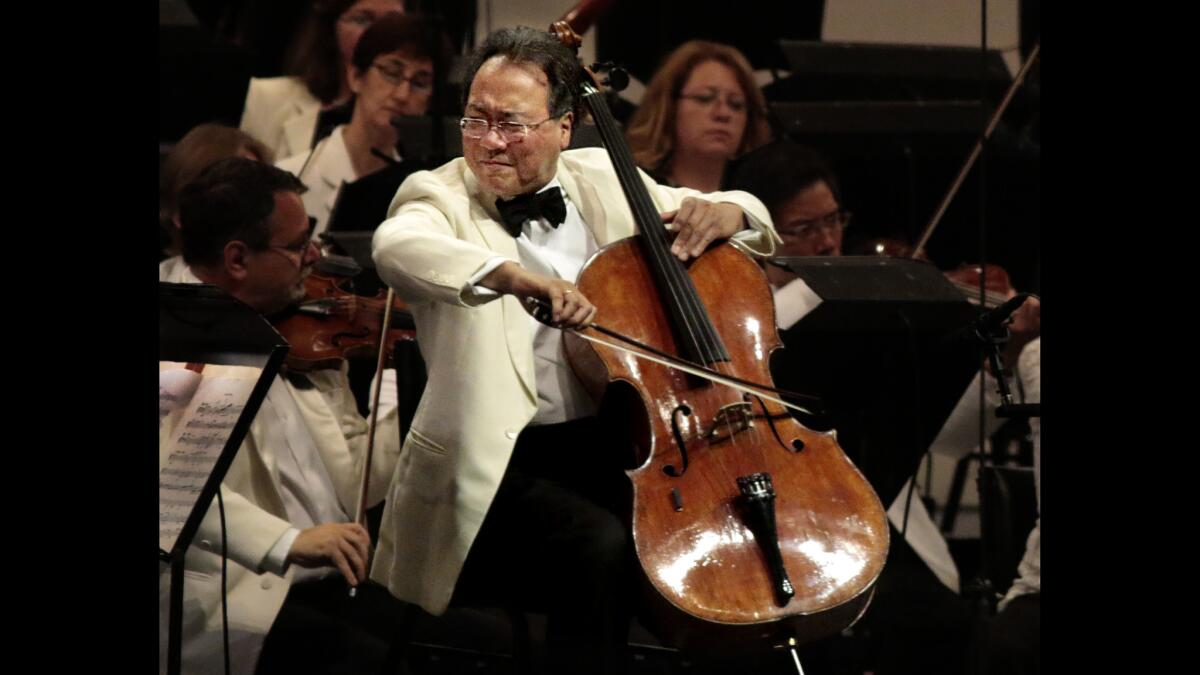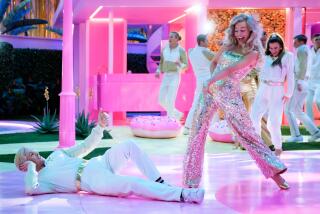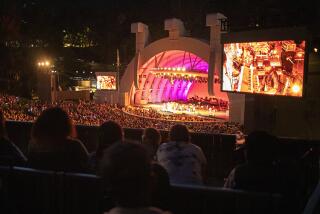Review: Yo-Yo Ma is marvelous during a strange night at Hollywood Bowl

Yo-Yo Ma played Elgar’s Cello Concerto at the Hollywood Bowl on Thursday night magnificently. A large audience, nearly 12,000 strong, was more than willing to fight terrible traffic jams caused by broken-down buses and whatnot to hear a superstar cellist.
The Bowl’s video screens penetrated in microscopic high definition Ma’s facial expressions, a high drama of rapture or anguish fit for Sarah Bernhardt. The effect was not unlike a silent movie in which melodramatic acting is amplified by music. Although in this case the Bowl’s vibrant sound system impressively projecting Ma’s resplendent tone seemed to amplify his physical gestures. And, yes, the Bowl does sell popcorn.
In the slow movement, a study of inconsolable sadness, visual close-ups of Ma’s fingers allied with the sonic close-ups provided a study in expressive use of vibrato, the strings quivering less and less as life seemed drained from intensively sad, lyric melody. With the camera moving in on Ma’s face, he looked on the verge of tears.
What a show! Yet dig just a little deeper, and what a strange show this night was.
Conductor Leonard Slatkin took a break from his otherwise Russian repertory with the Los Angeles Philharmonic this week at the Bowl. The program was British in the first half and French in the second, with the British part being about the loss and rekindling of Empire.
Elgar wrote his concerto in 1919, at the conclusion of World War I.
For the 62-year-old composer and England’s first distinctive musical voice in two centuries, victory represented the conflict’s final, irreversible calamity. The concerto’s temper is that of inconsolable melancholy, a melancholy made all the more poignant given that Elgar would live for an additional 15 years in sad irrelevancy. Neither the world nor musical style any longer esteemed his Edwardian spirit.
Nevertheless, the Cello Concerto’s gloom also raises nostalgia to meaningful high art. Somber, heartbreakingly lyrical melodies may seem self-sorry, but Elgar was a melancholic bloke who did, despite all, like a good day at the races. He even ends the concerto with a spry coda that may be the stiffest upper lip in all British music. We’re not supposed to believe him, but he’s determined to go off to the unknown sunset proud of what’s been.
Slatkin began the evening with William Walton’s “Crown Imperial” March, written for the coronation of George VI in 1937, music to give Britain a lift as it was about to rechannel its national grandeur with a world war again on the horizon. And in doing so Walton channels the spirit of none other than Elgar’s “Land of Hope and Glory.”
Directly after that cinematic glory, Ma enlarged Elgar’s plaintive solo cello opening to Bowl-filling majesty, making it sound not just a loud cry in the wilderness but also a call to arms. Ma then dug into every phrase. His playing could be a marvel of brilliant subtlety while at the same time milking details for the sake of wrenching drama.
He knew his job was to wow a crowd that had plainly come to be wowed with music not meant to wow. And the result, keenly seconded by Slatkin, was to turn this reflective, somber work into sensational high tragedy, the kind that ultimately makes you feel good for having felt bad.
That meant a spectacle of ferocity in the scherzo-like second movement, in which Ma was spectacular. It also meant no small amount of theatrical overstatement from Ma and Slatkin. Where Elgar’s pathos represented the regret, this performance revealed war’s inevitable horror. That final bit of ersatz stiff upper-lippery became a catastrophic climax.
Perhaps Elgar would have been gob-smacked by all this. But nostalgia never gets old. If this cello concerto played for a large crowd in a modern commercial venue by a great dramatist was not the nostalgia Elgar needed or hoped to convey, Ma convinced modern concertgoers in a commercial venue that it is something for them.
For the French second half, Slatkin turned to Debussy, the composer most responsible for the birth of French modernity at the start of the 20th century and another world altogether. But as a tenuous connection between the composers, Slatkin included a small semi-rarity of two well-known Debussy piano pieces, Sarabande and Danse, with their character altered by Ravel’s seldom-heard effusively nostalgic orchestrations.
“La Mer,” on the other hand, is a revolutionary score that, in 1903, invented a non-nostalgic music that would be useful in France, and elsewhere, ever after. But Debussy’s delicacy, the sea seen from pinpoint perspective, is not Bowl-friendly, and Slatkin compensated with direct, bold, dynamic phrasing that grabbed the attention.
Possibly Debussy’s amazingly specific and poetic orchestral evocation of wind and waves can be made to work no other way in the big Bowl. But if this was a “La Mer” for our time and place, it could also be heard as a reminder that we are not taking quite enough care of our seas.
Twitter: @markswed
More to Read
The biggest entertainment stories
Get our big stories about Hollywood, film, television, music, arts, culture and more right in your inbox as soon as they publish.
You may occasionally receive promotional content from the Los Angeles Times.







